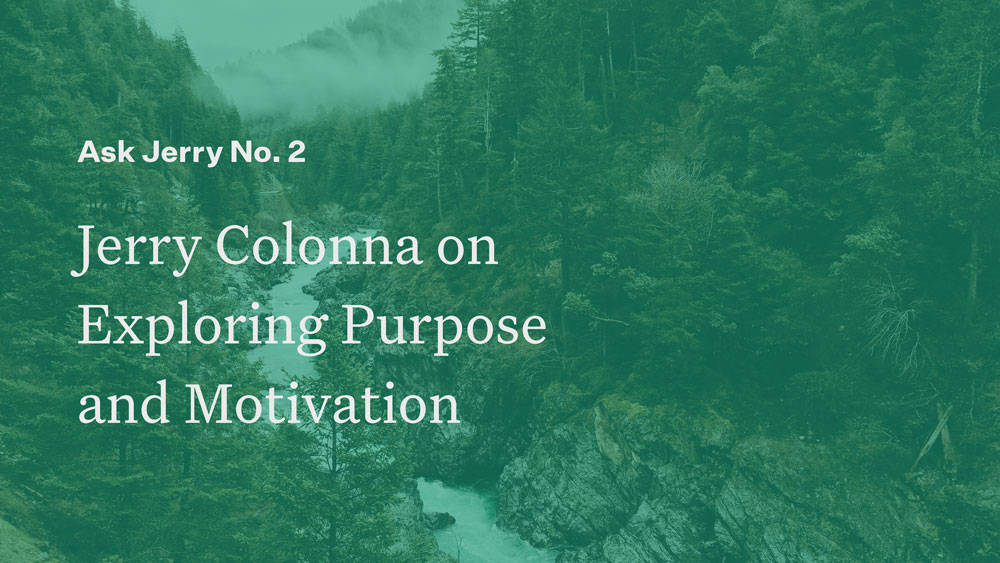
This post was written by Jerry Colonna and Andy Sparks.
Ask Jerry is a new limited series produced by Andy Sparks and the team at Everything, featuring Jerry Colonna, author of Reboot: Leadership and the Art of Growing Up, and CEO of executive coaching and leadership development firm Reboot.
Since founding Reboot in 2014, Jerry has developed a reputation for helping leaders grow through what he calls “radical self-inquiry,” and he is one of the most sought after coaches in the world of startups. In this series, we discuss questions about psychological habits, behavioral patterns, and the inner demons that can lead people to succeed—yet can be detrimental to their relationships and well-being. Submit your question here.
Andy Sparks: The conversation with Jerry for this edition reminded me of a story from a friend. Their German colleague received a considerable number of greetings every day, as his desk was closest to the office’s main entrance. As Americans do, visitors say, “How are you?” Instead of replying, “Fine, thank you,” he’d tell them exactly how he was in incredible detail. He was caught in a cultural mismatch, unfamiliar with how transactional the phrase was in America. One day, he hit his limit as a visitor’s impatience at his reply became visible and burst out, “Why do you ask me this question if you don’t want to hear the answer!?”
I think this says a lot about how Americans tend to think, and not think, about their lives. We spend most of our lives preparing. We’re trained to set goals—finish elementary, middle, and high school. Pick a major, finish a degree, get a job, get married, buy a house, and so on.
We imagine each of these tasks will bring us one step closer to finding our purpose, to arriving. We tell ourselves, we’ll have achieved what we set out to do, and meaning will reveal itself, and happiness will be unlocked. We focus on that image of us, brimming with satisfaction, nodding to ourselves saying, “It was all worth it.”
But we have no idea how we’re feeling today. We don’t make the connection between today and tomorrow, neither in how that future-focused mindset is affecting us today, or in how we’re feeling today might affect our future.
In 2017, WIRED published a piece on Jerry titled, “This Man Makes Founders Cry.” His team seized the opportunity and took to introducing him to groups as “the man who makes founders cry,” in a heartfelt tease and nom du guerre. In his typical fashion, Jerry rolls with it. As he steps up and the attention shifts to him, he says, “You want to know the secret question that he asked everybody that gets them to cry?” To which he follows with, “How are you?”
The key, he says, is asking the question as if he actually gives a shit. And he does. As founders begin to see the space Jerry creates for them to put down their heavy burdens for a moment, tears have a habit of following.
In this edition, we start with a question about finding our purpose in life, and Jerry explains that our ideas of how we get what we want are connected to how we’re feeling today. At the end, we invite readers to explore an exercise in radical-self inquiry to help connect the distant future to our every day.
How do you stay motivated when you’re still exploring what your calling is?
Jerry Colonna: What I hear is a profound and important question: “How do I find my purpose when I'm so busy working?” The person asking the question is thinking about their purpose and what it is they’re trying to be in terms of their relationship to their work.
Implicit in this question is a common misunderstanding that purpose is a place you arrive at, and then you’re done. Purpose, instead of being a destination you reach once in the far off future, is a daily practice.
The great Zen teacher Suzuki Roshi said, “To find the meaning of my life is to find the meaning of my day.”
Roshi calls our attention to how we derive a sense of purpose from how we conduct ourselves every day.
A few years ago, I had a conversation with my great friend Parker Palmer on the Reboot Podcast (#86—How Have You Lived Your Life?). He had just published his latest book, On the Brink of Everything: Grace, Gravity, and Getting Old, which I really recommend. Parker, now 81, is almost twenty-five years older than me, but we both sounded like old men sitting on a park bench. As we talked, we arrived at a powerful question, one that I explore in my book: “How have I lived my life?”
When thinking about where you’re going, really look around at who you’ve been, who you are now, where you are now.
To begin to figure those things out, it’s helpful to reflect on questions like, “Have I been and am I being kind? Am I being curious? Am I leaning into difficult places?” That’s where I think our opportunity is.
If our questioner were sitting here with us, they would probably say, “It's hard to make observations. It's hard to find time during my day to create space to answer these questions. I feel so busy. I feel so filled with stress”
And like a good coach, I wouldn’t answer the question directly. I'll turn around and say,
“Ah, that's an interesting observation. So you're living your life in such a way that you actually don't have time or space for you.”
And you might think, “Easy for you to say, Jerry.” But practicing your connection to your inner self, making time and space for you, is something you can do daily. Even if it’s five minutes while brushing your teeth. Look in the mirror and say, “How the fuck am I feeling? What am I excited about? What am I anxious about?”
This is part of my process, which I call radical self-inquiry. What’s so radical? It’s radical that we don’t actually pause and ask ourselves, “How are you? How am I doing?”
I do this. It’s the basis of my journaling every morning where I do a kind of self check-in. Sometimes my journal entries are just line after line of, “I’m anxious about this, I’ve been thinking about this.” I really try to resist the temptation to solve all those things and instead just name them—don’t overthink it. Don’t turn it into more work. Don’t turn it into something you avoid because it’s too hard and feels like an assignment.
The more you practice that, the more resilient you’ll be, the more resilient you are, the more your purpose will reveal itself to you. I hope that’s helpful.
Exercise on Radical Self-Inquiry: The Self Check-In
The next time you sit down to journal and reflect, start by asking yourself a few questions. Check in with yourself. Stream of consciousness. Resist the temptation to solve, and just name all the things.
- How am I doing? (No, really, how am I doing?)
- What’s on my mind?
- How am I feeling? Where in my body is that feeling more acutely felt?
Notes and References
- Suzuki Roshi, more formally known as Shunryū Suzuki, was a Sōtō Zen monk who founded the San Francisco Zen Center and is credited with popularizing Zen Buddhism in the United States (Wikipedia).
- Parker Palmer is an American author, activist, and educator who Jerry frequently cites as an influence. If you’re interested in learning more about him, we recommend reading Maria Popova’s piece on Brain Pickings,The Six Pillars of the Wholehearted Life: Parker Palmer’s Spectacular Naropa University Commencement Address. Jerry also recommends reading his books On the Brink of Everything and Let Your Life Speak.
This conversation was originally recorded by Paul Smalera. Edits by Rachel Jepsen. Photo credit to Steve Carter.
The Only Subscription
You Need to
Stay at the
Edge of AI
The essential toolkit for those shaping the future
"This might be the best value you
can get from an AI subscription."
- Jay S.
Join 100,000+ leaders, builders, and innovators

Email address
Already have an account? Sign in
What is included in a subscription?
Daily insights from AI pioneers + early access to powerful AI tools








Comments
Don't have an account? Sign up!